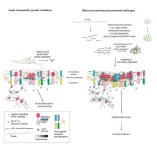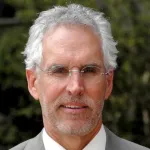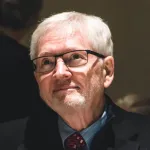(Press-News.org) AMHERST, Mass. – A team of researchers from the University of Massachusetts Amherst recently published a pioneering study that answers a central question in biology: how do organisms rally a wide range of cellular processes when they encounter a change—either internally or in the external environment—to thrive in good times or survive the bad times? The research, focused on plants and published in Cell, identifies the interactions between four compounds: pectin, receptor proteins FERONIA and LLG1 and the signal RALF peptide. In particular, the team discovered that a molecular condensation process, called liquid-liquid phase separation, that occurs between pectin and RALF at the cell wall-cell membrane interface governs how a stimulus triggers many cellular processes. Together, these processes generate a response advantageous to the plant.
“Biologists often work linearly: we observe as a stimulus comes in, and then we monitor a specific response along a certain cellular pathway that we believe is behind that response. But in reality, cells maintain a multitude of pathways, which are carefully maintained and need to be coordinated all the time,” says Alice Cheung, Distinguished Professor of Biochemistry and Molecular Biology at UMass Amherst and the paper’s senior author.
Cheung and her long-time collaborator and co-senior author Hen-Ming Wu have contemplated the question of stimulus and response ever since they discovered back in 2010 and 2015 that the FERIONIA-LLG1 receptor pair is an ideal candidate to tease apart the challenging puzzle. FERONIA-LLG1 impacts almost all aspects of plant life – growth from a just-sprouted seedling to mature and reproducing the next generation, and sustaining all kinds of challenges in between, like diseases and climatic extremes.
“It has taken many years from two very dedicated junior colleagues, postdoc James Ming-Che Liu and graduate student Jessica Fang-Ling Yeh, the co-first authors of the paper, and a recently graduated molecular and cellular biology Ph.D. student, Robert Yvon,” Cheung says. “Together they completed a set of studies that started from different but deliberately designed angles to provide a cohesive story, which is otherwise impossible to tell.”
The investigation began with an inquiry into how the signal (or ligand) RALF affects FERONIA-LLG1 in the cell membrane. The team observed some puzzling results: the cell didn’t simply take-up FERONIA-LLG1 into the cell, a process known as endocytosis and a typical response; every cell membrane molecule the team tested was affected. Furthermore, unlike typical ligand-receptor interaction, the ligand RALF remained outside the cell in a pectin-rich extracellular matrix called the cell wall.
The team then examined the biochemical and biophysical interactions between the four molecules, how these interactions affect the behavior of these molecules on the cellular level and how they affect plant physiological outcomes using two often-encountered environmental stresses: elevated temperature and salinity.
The results provide, for the first time, a mechanism to explain how plant cells coordinate many different pathways in response to a single stress signal to become more resilient and survive. The work also demonstrates for the first time how phase-separation at the cell wall-cell membrane interface, the frontline where a plant cell detects and responds to outside stimuli, can profoundly affect a collective cellular response. Cheung adds that “the work could not have been done without the core facilities in the Institute of Applied Life Sciences and the input of James Chambers, director of the Light Microscopy Core and a co-author on the paper.”
Contacts: Alice Cheung, acheung@biochem.umass.edu
Daegan Miller, drmiller@umass.edu
END
Researchers at UMass Amherst discover key to molecular mystery of how plants respond to changing conditions
Research offers a new understanding of coordinated cellular response in plants
2024-02-06
ELSE PRESS RELEASES FROM THIS DATE:
Patients with cancer who suffered a major adverse financial event more likely to be diagnosed with advanced stage disease
2024-02-06
New findings led by researchers at the American Cancer Society (ACS) and the National Cancer Institute (NCI) show more than one-third of cancer patients had a major adverse financial event – bankruptcy, lien, or eviction – before their cancer diagnosis. These patients with adverse financial events (AFEs) had a later-stage diagnosis compared with patients with no events. The findings are published today in the Journal of Clinical Oncology (JCO).
“Patients with a previous AFE not only face greater likelihood of more advanced cancer but also may encounter substantial barriers to receiving recommended care ...
Improving quality of life and sleep in people with memory problems without using drugs
2024-02-06
PHILADELPHIA (February 6, 2024) – A groundbreaking study from the University of Pennsylvania School of Nursing (Penn Nursing), recently published in Innovation in Aging, has shown promising results in improving the quality of life (QOL) and sleep quality in individuals living with memory problems. The research delves into the efficacy of a nonpharmacological approach in a trial known as the Healthy Patterns Sleep Program.
Nancy Hodgson, PhD, RN, FAAN, the Claire M. Fagin Leadership Professor in Nursing and Chair of Department of Biobehavioral Health ...
Mitsuo Uematsu selected as Fellow of The Oceanography Society
2024-02-06
The Oceanography Society (TOS) congratulates Emeritus Professor Mitsuo Uematsu on his selection as a Fellow. The citation for this honor recognizes his pioneering research on long-range atmospheric transport of Asian dust across the Pacific Ocean and its impact on marine biogeochemistry.
The nomination materials noted that Dr Uematsu’s research is of the highest quality and notable for its interdisciplinarity and international leadership, as well as its pioneering and continuing nature. These contributions are exemplified through his service on several international scientific committees such as Future Earth and the Executive ...
Claudia Benitez-Nelson selected as Fellow of The Oceanography Society
2024-02-06
The Oceanography Society (TOS) congratulates Claudia Benitez-Nelson on her selection as a Fellow. The citation on her certificate recognizes her outstanding contributions to understanding marine biogeochemical cycling and her exceptional commitment to mentoring and increasing diversity in ocean sciences.
The nomination materials noted that Dr. Benitez-Nelson is “one of the leading oceanographers of her generation…the world leader in the global phosphorus cycle, the use of isotopes (thorium) for quantifying export processes, and how carbon is transformed as it flows from coastal systems ...
Rutgers University Center for Ocean Observing Leadership selected to receive the Oceanography Society's Ocean Observing Team Award
2024-02-06
The Oceanography Society (TOS) congratulates the Rutgers University Center for Ocean Observing Leadership (RUCOOL) team on its selection as the recipient of the TOS Ocean Observing Team Award. This award recognizes innovation and excellence in sustained ocean observing for scientific and practical applications. The citation on the team’s certificate recognizes RUCOOL for transforming oceanography by sharing their pioneering sampling platforms, sensing methods, and their integration in models and education.
Rutgers University’s Center of Ocean Observing Leadership has ...
Phillip R. Taylor selected as Fellow of The Oceanography Society
2024-02-06
The Oceanography Society (TOS) congratulates Phillip R. Taylor for being named a Fellow. The citation on Dr. Taylor’s certificate recognizes him for the “expansion and diversification of the ocean sciences at national and international levels and for building cooperative interactions among agencies and scientific fields.”
Dr. Taylor’s nomination noted his “singular strength was a willingness to work with agency partners (within and outside of NSF) and science community leaders to develop novel programs that attracted additional investment, ...
Susan B. Cook selected as Fellow of The Oceanography Society
2024-02-06
The Oceanography Society (TOS) congratulates Susan B. Cook on her selection as a Fellow. The citation recognizes her for pivotal contributions toward expanding and strengthening ocean programs in higher education and for documenting and promoting the involvement of women and underrepresented groups in ocean science.
Dr. Cook’s contributions to the ocean sciences community extend well beyond her impactful service to The Oceanography Society, where she held the position of Secretary from 2007 to 2018. As one example, she expanded the focus of ocean education to the national level, first playing a pivotal role as an original ...
Frank Müller-Karger selected as Fellow of The Oceanography Society
2024-02-06
The Oceanography Society (TOS) congratulates Frank Müller-Karger on his selection as a Fellow. The citation recognizes him for extraordinary contributions and leadership in furthering our understanding of Earth and, in particular, the ocean, through the use of remote sensing and field work.
Frank Müller-Karger’s work encompasses a broad range of satellite observations and field time series in biological oceanography in open ocean, coastal, and benthic ecology applications. His research has laid ...
N. Ross Chapman selected as 2024 Recipient of the Walter Munk Medal
2024-02-06
The Oceanography Society (TOS) congratulates N. Ross Chapman for being selected as the 2024 recipient of The Oceanography Society’s Walter Munk Medal. The citation on his certificate recognizes him for applications of advanced signal processing approaches to acoustical oceanography and contributions to geo-acoustic inversions.
Among Dr. Chapman’s many achievements, the Medal Selection Committee noted his extraordinary contributions to geo-acoustic inversions, acoustic propagation modeling, ambient noise measurements, ...
Charitha Bandula Pattiaratchi selected as 2024 Recipient of The Oceanography Society's Mentoring Award
2024-02-06
The Oceanography Society (TOS) congratulates Prof. Charitha Bandula Pattiaratchi for being selected as the 2024 recipient of The Oceanography Society’s Mentoring Award. The citation on Dr. Pattiaratchi’s certificate recognizes him for an enviable record of mentoring students and young scientists. Over the course of his career, he has developed a world-renowned research and training program for early career researchers and graduate students in coastal oceanography at The University of Western Australia. To date, he has supervised more than 300 people including direct supervision of 277 dissertations.
Pattiaratchi is currently Professor of Coastal ...
LAST 30 PRESS RELEASES:
Learning makes brain cells work together, not apart
Engineers improve infrared devices using century-old materials
Physicists mathematically create the first ‘ideal glass’
Microbe exposure may not protect against developing allergic disease
Forest damage in Europe to rise by around 20% by 2100 even if warming is limited to 2°C
Rapid population growth helped koala’s recovery from severe genetic bottleneck
CAR-expressing astrocytes target and clear amyloid-β in mouse model of Alzheimer’s disease
Unique Rubisco subunit boosts carbon assimilation in land plants
Climate change will drive increasing forest disturbances across Europe throughout the next century
Enhanced brain cells clear away dementia-related proteins
This odd little plant could help turbocharge crop yields
Flipped chromosomal segments drive natural selection
Whole-genome study of koalas transforms how we understand genetic risk in endangered species
Worcester Polytechnic Institute identifies new tool for predicting Alzheimer’s disease
HSS studies highlight advantages of osseointegration for people with an amputation
Buck Institute launches Healthspan Horizons to turn long-term health data into Actionable healthspan insights
University of Ottawa Heart Institute, the University of Ottawa and McGill University launch ARCHIMEDES to advance health research in Canada
The world’s largest brain research prize awarded for groundbreaking discoveries on how we sense touch and pain
Magnetofluids help to overcome challenges in left atrial appendage occlusion
Brain-clearing cells offer clues to slowing Alzheimer’s disease progression
mRNA therapy restores fertility in genetically infertile mice
Cloaked stem cells evade immune rejection in mice, pointing to a potential universal donor cell line
Growth in telemedicine has not improved mental health care access in rural areas, study finds
Pitt scientists engineer “living eye drop” to support corneal healing
Outcomes of older adults with advanced cancer who prefer quality of life vs prolonging survival
Lower music volume levels in fitness class and perceived exercise intensity
Of crocodiles, counting and conferences
AERA announces 2026 award winners in education research
Saving two lives with one fruit drop
Photonic chips advance real-time learning in spiking neural systems
[Press-News.org] Researchers at UMass Amherst discover key to molecular mystery of how plants respond to changing conditionsResearch offers a new understanding of coordinated cellular response in plants









